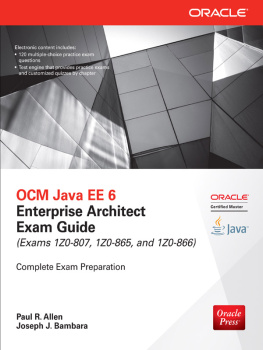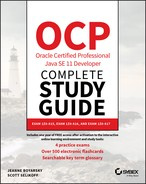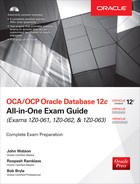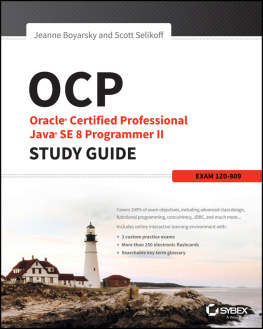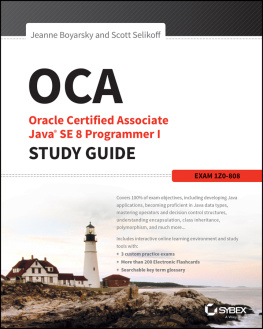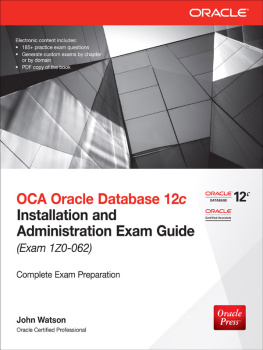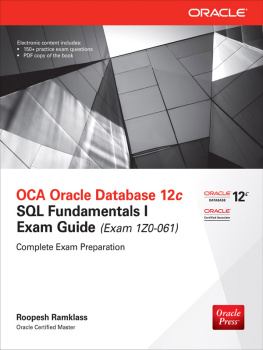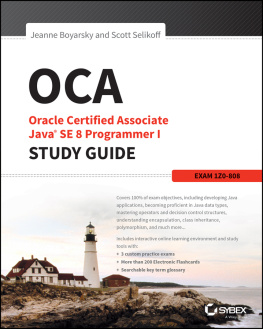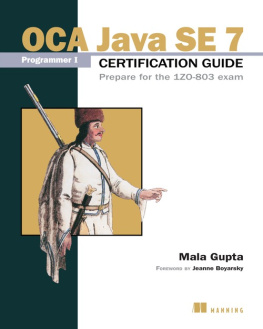OCM Java EE 6 Enterprise Architect Exam Guide
(Exams 1Z0-807, 1Z0-865 & 1Z0-866)
Paul R. Allen and Joseph J. Bambara
New YorkChicagoSan Francisco
AthensLondonMadridMexico City
MilanNew DelhiSingaporeSydneyToronto
McGraw-Hill Education is an independent entity from Oracle Corporation and is not affiliated with Oracle Corporation in any manner. This publication and digital content may be used in assisting students to prepare for the OCM Java EE 6 Enterprise Architect exams. Neither Oracle Corporation nor McGraw-Hill Education warrants that use of this publication and digital content will ensure passing the relevant exams.
Copyright 2014 by McGraw-Hill Education (Publisher). All rights reserved. Printed in the United States of America. Except as permitted under the Copyright Act of 1976, no part of this publication may be reproduced or distributed in any form or by any means, or stored in a database or retrieval system, without the prior written permission of Publisher, with the exception that the program listings may be entered, stored, and executed in a computer system, but they may not be reproduced for publication.
ISBN: 978-0-07-182674-7
MHID: 0-07-182674-2
e-Book conversion by Cenveo Publisher Services
Version 1.0
The material in this eBook also appears in the print version of this title: ISBN: 978-0-07-182678-5, MHID: 0-07-182678-5.
McGraw-Hill Education eBooks are available at special quantity discounts to use as premiums and sales promotions, or for use in corporate training programs. To contact a representative, please visit the Contact Us pages at www.mhprofessional.com.
All trademarks are trademarks of their respective owners. Rather than put a trademark symbol after every occurrence of a trademarked name, we use names in an editorial fashion only, and to the benefit of the trademark owner, with no intention of infringement of the trademark. Where such designations appear in this book, they have been printed with initial caps.
Oracle and Java are registered trademarks of Oracle Corporation and/or its affiliates. All other trademarks are the property of their respective owners, and McGraw-Hill Education makes no claim of ownership by the mention of products that contain these marks.
Screen displays of copyrighted Oracle software programs have been reproduced herein with the permission of Oracle Corporation and/or its affiliates.
Information has been obtained by Publisher from sources believed to be reliable. However, because of the possibility of human or mechanical error by our sources, Publisher, or others, Publisher does not guarantee to the accuracy, adequacy, or completeness of any information included in this work and is not responsible for any errors or omissions or the results obtained from the use of such information.
Oracle Corporation does not make any representations or warranties as to the accuracy, adequacy, or completeness of any information contained in this Work, and is not responsible for any errors or omissions.
TERMS OF USE
This is a copyrighted work and McGraw-Hill Education (McGraw-Hill) and its licensors reserve all rights in and to the work. Use of this work is subject to these terms. Except as permitted under the Copyright Act of 1976 and the right to store and retrieve one copy of the work, you may not decompile, disassemble, reverse engineer, reproduce, modify, create derivative works based upon, transmit, distribute, disseminate, sell, publish or sublicense the work or any part of it without McGraw-Hills prior consent. You may use the work for your own noncommercial and personal use; any other use of the work is strictly prohibited. Your right to use the work may be terminated if you fail to comply with these terms.
THE WORK IS PROVIDED AS IS. McGRAW-HILL AND ITS LICENSORS MAKE NO GUARANTEES OR WARRANTIES AS TO THE ACCURACY, ADEQUACY OR COMPLETENESS OF OR RESULTS TO BE OBTAINED FROM USING THE WORK, INCLUDING ANY INFORMATION THAT CAN BE ACCESSED THROUGH THE WORK VIA HYPERLINK OR OTHERWISE, AND EXPRESSLY DISCLAIM ANY WARRANTY, EXPRESS OR IMPLIED, INCLUDING BUT NOT LIMITED TO IMPLIED WARRANTIES OF MERCHANTABILITY OR FITNESS FOR A PARTICULAR PURPOSE. McGraw-Hill and its licensors do not warrant or guarantee that the functions contained in the work will meet your requirements or that its operation will be uninterrupted or error free. Neither McGraw-Hill nor its licensors shall be liable to you or anyone else for any inaccuracy, error or omission, regardless of cause, in the work or for any damages resulting therefrom. McGraw-Hill has no responsibility for the content of any information accessed through the work. Under no circumstances shall McGraw-Hill and/or its licensors be liable for any indirect, incidental, special, punitive, consequential or similar damages that result from the use of or inability to use the work, even if any of them has been advised of the possibility of such damages. This limitation of liability shall apply to any claim or cause whatsoever whether such claim or cause arises in contract, tort or otherwise.
I would like to dedicate this book to my children, Sophia and Terence.
I am so happy to be able to share time with you as you navigate your own paths and build your own castles.
Paul R. Allen
I would like to dedicate this book to my family (Roseanne, Vanessa, and Michael) and friends (especially Hillary Brower and Rolando Marino) and to the hope that we in America can properly educate our young and continue to lead the world in technology and innovation.
Joseph J. Bambara
ABOUT THE AUTHORS
Paul R. Allen is a principal of UCNY, Inc., an international consulting firm that helps Fortune 500 companies improve and streamline operations through the use of software technology. His e-mail address is . He has been developing applications systems for over 20 years. His industry experience includes financial, brokerage, pharmaceutical, and manufacturing verticals. He has taught numerous courses in computing at the Columbia University of New York. He has co-authored several books, including Sun Certified Enterprise Architect for Java EE Study Guide (McGraw-Hill, 2007 and 2003), J2EE Unleashed (Sams, 2002), SQL Server 7 Developers Guide (IDG, 2000), Informix: Universal Data Option (McGraw Hill, 1998), and PowerBuilder: A Guide to Developing Client/Server Applications (McGraw-Hill, 1995). He has taught numerous courses and given presentations on computing in several cities, including Berlin, Copenhagen, London, Los Angeles, Nashville, New York, Orlando, Oslo, Paris, Stockholm, Vienna, and Washington, D.C. over the past 15 years.
Joseph J. Bambara is a principal of UCNY, Inc., an international consulting firm that helps Fortune 500 companies improve operations through the use of database and object technology. His e-mail address is . He has been developing applications systems for over 30 years, including relational database development for the last 25 years and Java application server for web development for the past 15 years. He is a Certified Trainer and Developer. His industry experience includes financial, brokerage, manufacturing, medical, and entertainment. Mr. Bambara has a Bachelors and Masters degree in Computer Science. He also holds a Juris Doctorate in Law and is admitted to the New York Bar. He has taught various computer courses for CCNYs School of Engineering. He has co-authored the following books:

